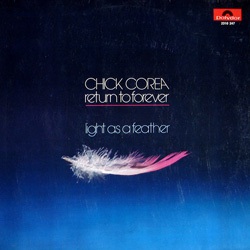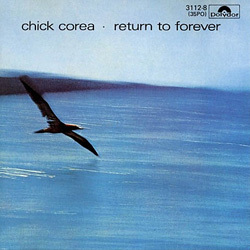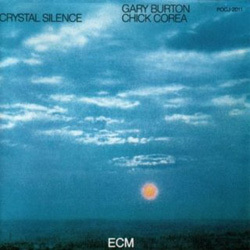
Zum Abschluss des Abends noch etwas Latin-Jazz: Chick Corea & "Return to Forever" schaffen auf "Light as a Feather" von 1973 (Polydor) die perfekte Balance aus elekroakustischem 70ies-Jazz und (wie immer relativer) Zugänglichkeit. Jedenfalls hat hier die Verwässerung, für die der Begriff "Fusion" in diesem Zusammenhang in den Augen Vieler steht, noch nicht Einzug gehalten.
Besonders das erste Stück "You're erverything" mit der wunderbaren Fender-Rhodes-Piano-Intro baut sich langsam auf und groovt zunehmend wie sch.....! Aber auch das wohl jedem bekannte Stück "Spain" steht dem nicht viel nach. Eine ruhige Meditation am E-Piano von großer Schönheit ist "Children's Song".
amazon.com hat geschrieben:Featuring the same band as the first Return to Forever album--vocalist Flora Purim, saxophonist-flutist Joe Farrell, bassist Stanley Clarke, and drummer Airto-- 1973's Light As a Feather was the result of a conscious effort on Chick Corea's part to communicate with a broader audience. Although Corea's electric piano and Purim's spacey-samba vocals might sound dated, the album includes a couple of Corea's most beloved compositions, "500 Miles High" and "Spain." Subsequent Return to Forever albums turned to conceptual bombast and silly fantasies. Here, Corea strikes an appealing balance between art and accessibility. --Rick Mitchell
Wem das noch nicht wild genug ist, dem sei die erste Aufnahme von "Return to Forever" (ECM, 1972) ans Herz gelegt:allmusic.com hat geschrieben:Always tied to a confusing time line, the first released recording from the original configuration of Return to Forever was actually their second session. An initial studio date from the ECM label done in February of 1972 wasn't issued until after the band had changed in 1975. The Polydor/Verve recording from October of 1972 is indeed this 1973 release, featuring the same band with Chick Corea, Stanley Clarke, Airto Moreira, Joe Farrell, and Flora Purim. There's no need splitting hairs, as both are five-star albums, showcasing many of the keyboardist's long enduring, immediately recognizable, and highly melodic compositions. Farrell's happy flute, Purim's in-the-clouds wordless vocals, the electrifying percussion of Airto, and Clarke's deft and loping electric bass guitar lines are all wrapped in a stew of Brazilian samba and Corea's Fender Rhodes electric piano, certainly setting a tone and the highest bar for the music of peer groups to follow. "Captain Marvel" -- the seed for the band sans Farrell and Purim that was expanded into a full concept album with Stan Getz -- is here as a steamy fusion samba with Corea dancing on the keys. By now the beautiful "500 Miles High" has become Purim's signature song with Neville Potter's lyrics and Corea's stabbing chords, and unfortunately became a hippie drug anthem. Perhaps Corea's definitive song of all time, and covered ad infinitum by professional and school bands, "Spain" retains the quirky melody, handclapped interlude, up-and-down dynamics, exciting jam section, and variation in time, tempo, and colorations that always command interest despite a running time of near ten minutes. "You're Everything" is a romantic classic that surely has been heard at many weddings, with another lyric by Potter sung in heaven by Purim, while the title track is Purim's lyric in a looser musical framework with Clarke's chart coalescing with Corea and Farrell's pungent flute work. As much as the others have become icons, the extraordinary sound of Farrell on this date should never be trivialized or underestimated. The final track, "Children's Song," was a springboard for several of Corea's full-length album projects, and is heard here for the first time via a trio setting in a slow, birthlike motif. The expanded version of this recording includes many alternate takes of four of these selections, but also includes "Matrix," which was not on any RTF albums, and there are four versions of "What Game Shall We Play Today?," which was only available on the ECM release. From a historical perspective, this is the most important effort of Corea's career, quite different than his prior previous progressive or improvising efforts, and the pivotal beginning of his career as the most popular contemporary jazz keyboardist in history.

Besondere Highlights: der zwischen mysteriös und zügellos changierende Einstieg, und das an zweiter Stelle folgende ruhige und wunderschöne "Crystal Silence".
Auch sehr schön: das Duo-Album "Chrystal Silence" (ECM, 1972) mit Chick Corea am Piano und Gary Burton am Vibraphon, auf dem das eben erwähnte Stück "Crystal Silence" in einer anderen schönen Version drauf ist.allmusic.com hat geschrieben:The legendary first lineup of Chick Corea's fusion band Return to Forever debuted on this classic album (titled after the group but credited to Corea), featuring Joe Farrell on soprano sax and flute, the Brazilian team of vocalist Flora Purim and drummer/percussionist Airto Moreira, and electric bass whiz Stanley Clarke. It wasn't actually released in the U.S. until 1975, which was why the group's second album, Light as a Feather, initially made the Return to Forever name. Nonetheless, Return to Forever is every bit as classic, using a similar blend of spacy electric-piano fusion and Brazilian and Latin rhythms. It's all very warm, light, and airy, like a soft breeze on a tropical beach -- hardly the sort of firebrand approach to fusion that Miles Davis, Tony Williams, and the Mahavishnu Orchestra were exploring, and far less rooted in funk or rock. Corea also bathes the album in an undertone of trippy mysticism, not only in the (admittedly dated) lyrics, but in his cosmic keyboard wanderings, which remain melodic and accessible through most of the record. There's one genuine pop song in the groovy samba "What Game Shall We Play Today," and while "Sometime Ago" has similar elements, it's part of an ambitious side-long medley that features a stream-of-consciousness intro and a jubilant, Spanish/Mexican-style closing section called "La Fiesta," complete with castanets and flamenco modes. The title track is another multi-sectioned work, featuring Corea and Purim in wordless unison on two different, catchy themes, plus breezy work from Farrell and lots of Brazilian-flavored rhythmic interplay. And the dreamy, meditative "Crystal Silence" is an underrated gem waiting to be rediscovered. Certainly, this edition of Return to Forever wasn't inclined toward high-voltage jazz-rock (as the next one was), but this group's two albums still stand as some of the most imaginative and distinctive early fusion recordings.

Martinallmusic.com hat geschrieben:For Crystal Silence, the first of several partnerships between Chick Corea and vibraphonist Gary Burton in the 1970s, the two musicians selected an interesting array of material. The compositions on this record are all modern ones, either by Steve Swallow, Mike Gibbs, or Corea himself. It is a mostly downtempo affair, which allows each player to stretch out and play highly melodic solos over the often difficult changes. In keeping with most ECM releases, there is a distinct presence of European elements to the improvisations. There are few overt blues or bebop phrases, Corea and Burton opting instead for modern melodies to fuel their improvisations. Burton has managed to internalize the Spanish and modal implications of Corea's tunes with little difficulty, and solos with joyful ease through such tracks as "Señor Mouse." Corea himself is absolutely burning. His solo contribution on the same track is both fiery and introspective, combining in one statement the poles for which he is best-known. The title track is also the centerpiece of the album, a nine-minute exploration of the Corea ballad that first appeared on his Return to Forever record in 1972. In keeping with the tradition of the great masters of the ballad form, time seems to disappear as Burton and Corea lovingly caress the song's simple melody and dance effortlessly around the chords, building intensity only to let it subside once more. Crystal Silence is a sublime indication of what two master improvisers can do given quality raw material, with the first side of this record being particularly flawless. Improvised music is rarely this coherent and melodic. Essential for fans of Corea, Burton, or jazz in general.

